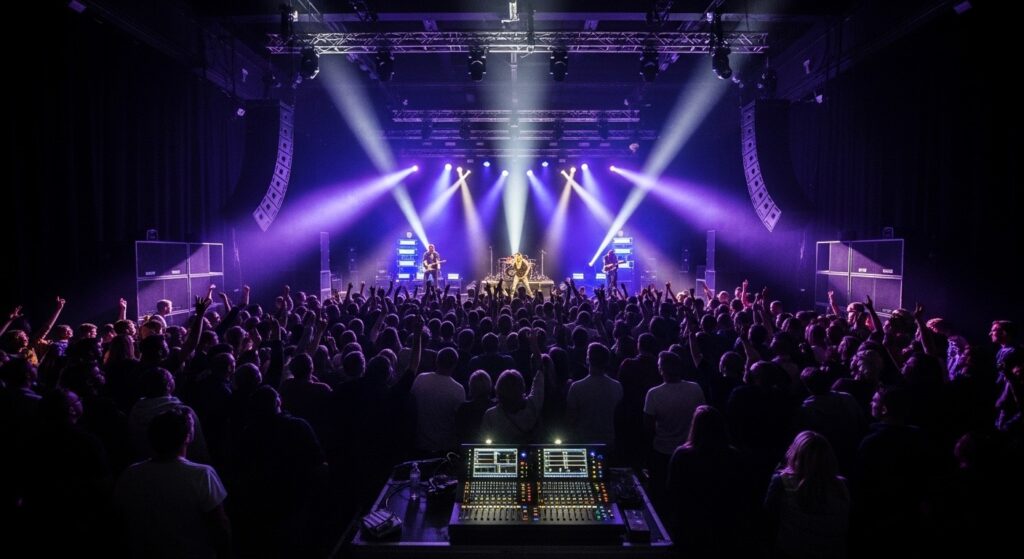
AMA: Answers to Your Questions About Music Promotor Tools
If you are like most of the music promoters, venue owners and managers, and artist reps we chat with you’ve likely never purchased software tools designed to help music promoters succeed. It’s just not something that people do every day. So, if you have a ton of questions, don’t worry. You aren’t alone. Fortunately, we live and breath music promoter tools every day, and we can help. Here are the answers to the questions that we get most often.
1 – What capabilities do music promoter software tools offer?
This is our favorite question because the answer is – who knows? Lots of products claim to be useful to music promoters, but many of them were designed as general business or project management tools. Vendors try to meet the needs of music promoters by sticking a square peg in a round hole. You never know what you might get. So instead, we’re going to answer the question, “What capabilities should music promoter software tools offer.”
Calendar Management – The live music business is a date driven one, so calendar management is a fundamental function that must be apart of any toolset you choose. Ideally, you can manage your booked dates, holds, challenges, and other appointments right from one central calendar. You should be able to share the calendar with your team so that everyone is up to speed on what’s happening and when.
Offer Generation – Creating an offer is a unique task to the music industry, and most generic business tools aren’t set up to give promoters the flexibility they need to create a variety of offer types, but if you look, you can find a solution that will let you do exactly that. Insist on a solution that enables you to create a branded, professional looking offer sheet in just a few minutes. You should be able to decide which cost and revenue items are visible in the offer and compare offer scenarios to maximize the potential of each event.
Revenue and Expense Reporting – If you are like our other clients, you got into this life for the love of music, but making money is high up on your “To Do” list. The key to profitability is accurate tracking of every expense and incoming dollar. You’ll make more if you can track each expense as it occurs, rather than waiting for settlement to figure it out. Ideally, you’ll link the ticketing system to your music promoter tools for real-time insight into the status of each show. The more visibility you have into ROI and income, the better position you will be in to control your financial destiny.
Streamlined Settlement – After show settlement shouldn’t be something that you, the venue, or the artists dread. With the right music promoter software in place, you’ll have all of the expenses, payments, taxes, other variable payments, and remainder owed all available in one place. Everyone gets paid what they have earned based on documentation, and there is little room for disagreement or heartburn.
Collaboration Features – Putting on a great show (ideally, a sold-out one), takes teamwork. The platform you choose should streamline collaboration by tracking all communications without resorting to email (more on that in a bit). It should create a historical record of each event allowing your team to get smarter with every show. The best solutions even have a built-in workflow for approvals of confirmations, challenges, budgets, offers, and settlement.
A Mobile App – It’s 2019 – duh.
2 – What are the benefits for promoters, venues, and talent?
So, what do you gain when you take advantage of all of those capabilities?
Better Use of Your Time – The average professional spends 28% of the work day reading and answering email, according to a McKinsey analysis. I bet it is even more for music promoters. With music promoter tools in place, you can save yourself that time and effort by concentrating all of the essential messages and data in one place. Beyond email, if you are spending hours creating offers, tracking down expenses, and slugging through settlements, that’s all time that you aren’t devoting to doing what you love (and what pays the bills).
Better Relationships – Ours is a relationship business. Music promoters are most successful when they have relationships with venue managers and artists that are built on trust and exceptional performance. When you’ve got the right technology in place, you can create a reputation for quick responses, accurate reporting, and excellent revenue prediction skills. You become the promoter that everyone wants to work with.
Better Results – Obviously, event ROI is crucial. When you have data visualization tools at your disposal, you can understand your spend and your true net. You can make accurate predictions about future results based on past data and learn from experience how to get even more profit out of every show.
3 – Do you need special technical skills and training to use music promoter software?
You shouldn’t. If you look at music promoter tools that seem clunky or hard to use, just walk away. Find a solution that has invested in a user experience that is intuitive, good looking, and fast. The best business applications today are as easy to use as the consumer apps you use every day without an IT team backing you up.
4 – Why not just use spreadsheets or project management tools?
See the section about saving time above. Email and spreadsheets are the biggest time suck in business. Email conversations get difficult to follow, they are not linked to a particular event, and they are difficult to catalog into a knowledge repository. Was everyone who needed to see the info copied? Did all of the right documents get attached? Did you save it to the right folder? Who knows? Spreadsheets are arguably worse. They are easy to break. It’s hard to track revisions, and they are just passive containers of information. A spreadsheet will never give you a warning when a deadline is approaching, or your hold status has changed.
5 – How do I choose the best solution?
If you find a solution that has all of the capabilities listed above, you are on the right track, but there are a couple of additional things to consider. Does the vendor really understand the live music business? It is unlike any other and focus groups or surveys don’t give vendors the kind of insight necessary to really know what you need in a solution. Look for leaders who have been in the game.
Hopefully, you feel a little more on solid ground as you continue your search for software solutions for music promoters. If there are questions, we haven’t addressed, drop us a line, we’d be delighted to help.

Matt Ford is the founder and CEO of Prism.fm, an Austin-based software company revolutionizing live music event management. With a background in entrepreneurship and a degree from the University of Wisconsin-Madison School of Business, Ford combined his self-taught coding skills with firsthand experience as a concert promoter to address the inefficiencies he observed in the industry. In 2018, he launched Prism.fm, an all-in-one platform designed to streamline operations for venues, promoters, and agencies by replacing cumbersome spreadsheets with integrated tools for booking, financial tracking, and contract management. Under his leadership, Prism.fm has grown significantly, achieving $3 million in annual recurring revenue post-COVID and securing over $15 million in funding . Ford’s commitment to building user-centric solutions has positioned Prism.fm as a trusted partner for over 1,500 venues and promoters worldwide.



